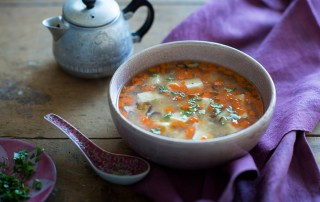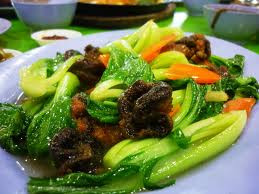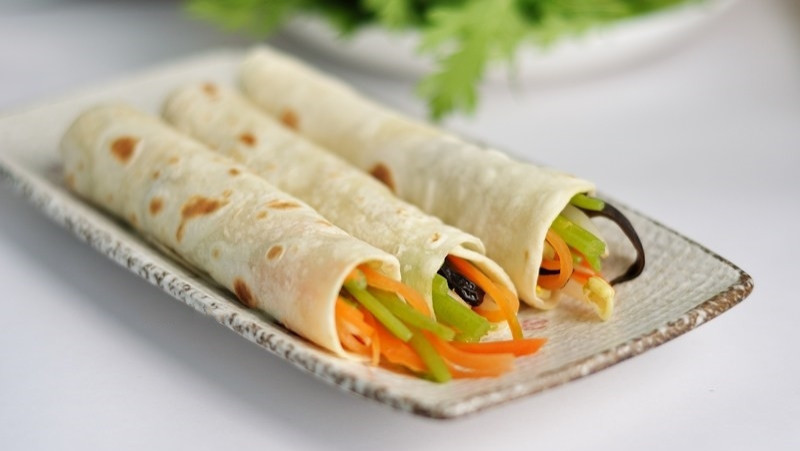How to Survive as a Vegetarian in China
Being a vegetarian in China can be a struggle. When specifically asking the fuwuyuan for a dish without meat, more often than not there will always be some small pieces of meat sprinkled on top of your dish, even after they reassured you there was no meat in it.
Knowing this, you would think that foreigners with a vegetarian lifestyle coming to China would put their vegetarianism on hold, right? Nope. Surprisingly enough, it’s quite common that foreigners coming to live in China convert to vegetarianism once they have arrived. This is probably because of not so strict regulations when it comes to keeping animals. Anyone who has entered a Chinese supermarket has probably seen the frogs or other animals being held in poor conditions.
So why is it that even plain vegetable dishes are still decorated with minuscule pieces of meat? Generally, meat is used in a lot of dishes to add flavor. Apart from that, they are often use it as garnish. We asked Gwen from vegetarian restaurant D’lish in Shanghai and she said that people don’t always consider it as meat, but just as decoration. Besides the fact that meat is used to add flavor and to make your dish look prettier, there’s the fact that eating meat is considered a sign of prosperity in China. In fact, the Chinese character for the verb to have is derived from an ancient character showing a hand holding meat – it was a common conception that if you had meat, you had everything. 
The majority of Chinese who are vegetarian choose this lifestyle because of their religious Buddhist beliefs. A big majority still doesn’t really know what being vegetarian or vegan means and what the impact of eating a lot of meat is. And even though vegetarianism is a growing trend among the Chinese in the bigger cities, the majority of vegetarians are still foreigners, says Gwen.
 But, good news! Vegetarianism, or consuming a healthy diet for that matter, shouldn’t be all that hard. Because Chinese cuisine uses a lot of vegetables, vegetarian food is available everywhere in China, even though its population is not vegetarian. You just have to know which are the right dishes to order.
But, good news! Vegetarianism, or consuming a healthy diet for that matter, shouldn’t be all that hard. Because Chinese cuisine uses a lot of vegetables, vegetarian food is available everywhere in China, even though its population is not vegetarian. You just have to know which are the right dishes to order.
We have created a guide full of tips and Chinese sentences that you can use the next time you order food in a restaurant.
Useful words and phrases
I am vegetarian: Wǒ chīsù (我吃素)
I don’t eat meat: Wǒ bùchī rènhé ròulèi (我不吃任何肉类)
I am Buddhist: Wǒ shì fójiàotú (我是佛教徒)
I cannot eat…: Wǒ bùnéng chī… (我不能吃)
I do not eat fish, milk, cheese, butter, eggs, honey, chicken stock, meat broth, fish stock, fish sauce, or lard: Wǒ bùchī yú, niúnǎi, nǎilào, huángyóu, jīdàn, fēngmì, jītāng, ròutāng, yútāng, yújiàng, zhūyóu.
(我不吃鱼、牛奶、 奶酪、黄油、鸡蛋、蜂蜜、鸡汤、肉汤、鱼汤、鱼酱、猪油)
Snacks & dishes
Cháyèdàn (茶叶蛋): tea eggs
Cōngyóubǐng (葱油饼): scallion oil pancake
Málàtàng (麻辣): hot spicy soup
Dàntà (蛋挞): egg tart
Qingcai baozi (青菜包子): baozi filled with marinated tofu, mushrooms and bok choy
Xīhóngshì chǎodàn (西红柿炒蛋): fried egg with tomato
Xiānggū yóucài (香菇油菜): sauteed cabbage with mushrooms

Cuìpí dòufu (脆皮豆腐): crispy tofu skin
Suànní bōcài (蒜泥菠菜): spinach fried with garlic
Jīnzhēngū huángguā (金针菇黄瓜): enoki mushroom with cucumber
Shǒusī yuánbáicài (手撕圆白菜): hand-torn fried cabbage with chili
Dìsānxiān (地三鲜): eggpant with peppers and potato
Málà dòufu (麻辣豆腐): spicy tofu
Dàbàncài (大拌菜): salad with dressing
Xuěcài chǎo dòuyá (雪菜炒豆芽): fried cabbage and bean sprouts
Pāi huángguā (拍黄瓜): cucumber and crushed garlic